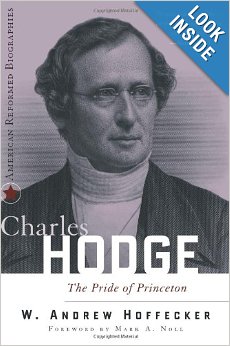 Today is the anniversary of the birth of Charles Hodge, a towering leader in American Presbyterianism. We do well to pursue biblical studies and theology with his disciplined passion.
Today is the anniversary of the birth of Charles Hodge, a towering leader in American Presbyterianism. We do well to pursue biblical studies and theology with his disciplined passion.
Evangelical believers of previous generations spoke of “the force of truth.” And rightly so. Paul rejoices that the Romans “obeyed from the heart that form of doctrine to which you were delivered” (Romans 6:17). That the union of will (obedience), affections (heart), and intellect (form of doctrine) marked their mature faith is no surprise. Through his Word, God appeals to our hearts through the mind, creating godly affections and sanctifying behavior.
Charles Hodge knew the force of truth. His teaching career at Princeton Seminary spanned 58 years (1820-1878). Relationships with six decades of ministerial students, participation in the ecclesiastical courts of the church, and an impressive array of published works made him the most influential Presbyterian of the 19th century. Andrew Hoffecker’s Charles Hodge: The Pride of Princeton is a well researched biography that captures Hodge’s commendable piety, scholarship and churchmanship.
A February 13, 1820 diary entry reveals Hodge’s approach to teaching:
“May I be taught of God that I may be able to teach others also. It is only the heart that has been deeply exercised in divine things which can enable us to preach experimentally to others. Piety is the life of a minister.”
Hodge’s commentaries, journal articles, and three-volume Systematic Theology present biblical truth powerfully and persuasively. My personal favorite is The Way of Life. Prepared for the American Sunday School Union in 1841, it exemplifies the type of devotional writing that grasps the indissoluble union between the theological exposition of Scripture and holiness of life.
Here are a few selections from the last chapter of The Way of Life:
“The secret of holy living lies in this doctrine of the union of the believer with Christ. This is not only the ground of his hope of pardon, but the source of the strength whereby he dies unto sin and lives unto righteousness. It is by being rooted and grounded in Christ that he is strengthened with might by his Spirit in the inner man, and is enabled to comprehend the breadth, and length, and depth, and height of the mystery of redemption, and to know the love of Christ which passes knowledge, and is filled with all the fullness of God. It is this doctrine which sustains him under all his trials, and enables him to triumph over all his enemies; for it is not he that lives, but Christ that lives in him, giving him grace sufficient for his day, and purifying unto himself as one of his peculiar people zealous of good works.”
“ . . . One hour’s communion with God produces an impression never to be effaced; it renders the soul forever less susceptible of evil, and more susceptible of good. And as the Holy Spirit is ever exciting the soul to the exercise of holiness, and bringing it into communion with God, he thus renders it more and more holy, and better fitted for the unchanging and perfect holiness of heaven.”
“It is most unreasonable to expect to be conformed to the image of God, unless the truth concerning God be made to operate often and continuously upon the mind. How can a heart that is filled with the thoughts and cares of the world, and especially one which is often moved to evil by the thoughts or sight of sin, expect that the affections answer to the holiness, good, or greatness of God, should gather strength within it? How can the love of Christ increase in the bosoms of those who hardly ever think of him or his work? This cannot be without a change in the very nature of things; and, therefore, we cannot make progress in holiness unless we devote much time to the reading, hearing, and meditating upon the word of God, which is the truth whereby we are sanctified. The more this truth is brought before the mind; the more we commune with it, entering into its import, applying it to our own case, appropriating its principles, appreciating its motives, rejoicing in its promises, trembling at its threatenings, rising by its influence from what is seen and temporal to what is unseen and eternal, the more we expect to be transformed by the renewing of our mind, so as to approve and love whatever is holy, just, and good. Men distinguished for their piety have been men of meditation as well as men of prayer; men accustomed to withdraw the mind from the influence of the world with its thousand joys and sorrows, and to bring it under the influence of the doctrines, precepts, and promises of the word of God.”
At Christmas we contemplate the birth of our Savior who is “full of grace and truth” (John1:14). Jesus said, “For this reason I was born, and for this I came into the world, to testify to the truth. Everyone on the side of truth listens to me” (John 18:37).
As the old year concludes, we prepare ourselves for a new year of devotion to Jesus and his truth. May the mind of Jesus so fill us that, like him, we say: “My food is to do the will of him who sent me and to finish his work (John 4:34) and “I have come to do your will, O God” (Hebrews 10:7).